This is the website of Abulsme Noibatno Itramne (also known as Sam Minter).
Posts here are rare these days. For current stuff, follow me on Mastodon
|
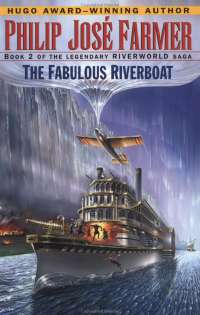 Author: Phillip Jose Farmer Author: Phillip Jose Farmer
Started: 11 Jan 2006
Finished: 16 Jan 2006
234p / 6d
39 p/d
I averaged 39 pages a day over 6 days, but the reality is that almost all of that was the first day while I was on the plane from Seattle to Florida. Then I read just a little a day until I finished it up.
This is the second of PJF’s Riverworld series. I am not home and can’t look up and find my records for when I last read the first one, but judging from when I bought this one, it was in 2002. So a few years ago. And of course I had read it before then many years earlier. The first one had Sir Richard Francis Burton as the main character. This one has Sam Clemens (Mark Twain) as the main character. The premise of this whole story is that everyone who ever lived on Earth from Pre history to about 2050 (minus children who died before age 5) are resurrected on this “Riverworld” which was obviously artificially set up and planned by SOMEBODY. The books are mainly the story of how society reevolves in this Riverworld, and the quest of a small group of people (many of them well known people from history) to find out who created this world and why.
It is a fun series of books. In 2003 the Sci-Fi channel did a made for TV movie very loosely based on the series. I think I watched it. But I have absolutely no memory of it what so ever. It must have really sucked and I wiped it from my memory. Ah yes, in the reviews on Netflix there are some gem comments like ” This was perhaps the saddest excuse for entertainment I have ever seen. I was embarassed watching it, and even more embarassed that I finished it. I want to apologize to the human race for having disgraced it by watching this movie.” Oh well, I put it on my Netflix list anyway.
But back to the book. It is fun to watch the various historical characters interact. There is a bit less of that and the clash between people from different places and times as there were in the first one, although there is still a lot. Mainly Sam Clemens and King John in this book. But there are a few other real historical figures. Just a fun what if. Nothing deep. The entirety of the plot of this book is about Sam trying to build a big riverboat to travel to the headwaters of the river where he thinks the mystery of the planet and the resurrection will be solved.
Pretty lightweight read. Good for the plane. In another few year’s maybe I”ll read the 3rd book in the series. :-)
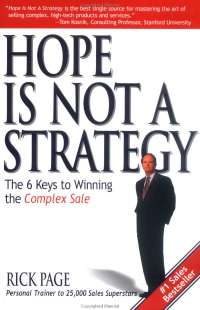 Author: Rick Page Author: Rick Page
Started: 26 Dec 2005
Finished: 11 Jan 2006
178p / 17d
10 p/d
Soon after my ex-employer (who I will not name) first told me that they wanted me to start playing an increasingly sales oriented role, my boss gave me this to read. I put it on the pile to read, but did not rush to it. They kept saying how important this book was in terms of the approaches it advocated and such. I just kept thinking that if they were so hot on a book called “Hope is Not a Strategy” why did they run the company in a way that seemed like hope was the ONLY strategy. Everything seemed predicated on making wild promises to get business and then crossing your fingers and hoping that somehow all the pieces would come together in time if everyone just pushed hard enough.
But anyway, a little after I had given my notice and I was done with them, I actually got to the book. And it really does have a lot to say that do make sense when doing sales into a complex sales process. Now, I tend to be uncomfortable with sales in general. I’m much more comfortable with a retail model than a model that actually requires sales people. But if you are in a mold that requires that, and where the people doing the buying have a complex process and things are decided in the ways that often go with that, OK, this has some strategies. Do I have any idea if they are optimal or not? No idea. And thank goodness I’m not being asked to think about that sort of thing any more, so I really just don’t have to care.
Not much else to say about this book except this:
After reading it I note that my ex-employers while taking lessons from many chapters of the book, have apperantly been practicing selective reading. There are a few important passages in the book that they seem to have neglected:
Page 14: “The ethical premise of competitive selling is first, your solution is genuinely good for the client’s organization, and second, your tactics remain morally, legally, and ethically sound. If the former is not true, you should get out of the account. If the latter is not true, you should get out of the business.”
Page 15: “A short-term oriented, predatory sales force can actually be a long-term sales prevention force. Unless you exceed expectations of most clients and delight a few, you will not build a foundation of customer loyalty.”
Page 154: “Every satisfied client is a neutron that can bang into another marketing molecule releasing enormous energy and enthusiasm for you and your company. Of course, if your clients are unhappy with the results of what they bought, then the nuclear metaphor becomes one of toxic pollution and fallout as one bad reference cancels out half a dozen good ones.”
Page 167: “Failure to exceed expectations will mean that in the long run, you are actually performing a sales prevention activity and inoculating the account from further business with you.”
But then again, I really didn’t need a book to tell me any of that.
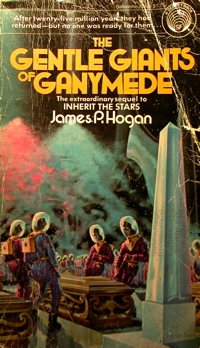 Author: James P. Hogan Author: James P. Hogan
Started: 14 Dec 2005
Finished: 26 Dec 2005
246p / 13d
19 p/d
So from pop Physics to an old school 1978 era hard scifi paperback. This kind of story really excited me as a teenager. There is practically no plot. Here, let me give it a shot:
- Scientists investigate old alien wreck
- The aliens show up unexpectidly
- People make friends with the aliens
- The aliens visit Earth and like it
- The aliens decide to leave again
Yup, that’s it. The whole plot. Now, that is not all there is to the book, it just isn’t a plot driven book. It is pretty much all about exploring an idea and some scientific “what ifs”. Over the course of the book the author goes into more detail and reveals more of the puzzle as his characters go through the investigative process. But mostly we have exposition. I kept seeing the big flashing “exposition” sign as I went through the book. Whole discussions that you would read but think, these characters would not actually discuss this in this way, they are reviewing facts both would know. This conversation is for the reader’s benefit only.
But that’s OK. This is a sequel to Inherit the Stars. And then there are three more in the series after these two, the most recent of which was published just this year. I’d read the first three as a teenager. Haven’t ever read the last two. Together they tell the story of scientists uncovering the past history of the solar system. The biggest surprise being the true origins of humanity and how they interacted with a race called the Minervans in pre-historic times. Then it explores some of the impacts of what happens when the two species meet again. At least that’s where it is as of the first two books.
It didn’t capture me quite so much as when I was young, but the whole construction of the scenerios and the slow unwrapping of what happened still facinates. As I said, it isn’t about the plot, it certainly isn’t about the characters, both of those are just the bare minimum needed to support a construction that will allow the exploration of a few scientific ideas. “What would an intelligent species act like if it evolved a non-predator species”. “What would the process be to unravel information about a past society if we found just a few remnants”. Etc. You don’t really need the story part, but it makes it a little more “fun” than if it had just been written as an academic paper. But yet, it is that academic speculation that is the core and what makes it fun and worth reading.
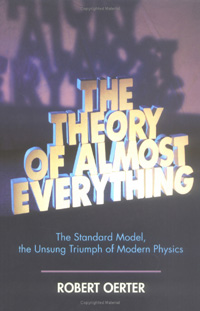 Author: Robert Oerter Author: Robert Oerter
Started: 4 Dec 2005
Finished: 14 Dec 2005
327p / 11d
30 p/d
When I left the Jefferson Davis book in a hotel and hadn’t yet replaced it, Brandy bought me this so I would have a book on my next plane flight. It was a very kind gesture. Of course, being all the way I am and stuff, I refused to start the book, because I had started the other book, and I had to finish that one before I could start another one, and then of course there would have to be a fiction book in between because I alternate fiction and non-fiction and such. I was of course being a little bit of a nut. But in the end I did indeed get a new copy of the Davis book, read that, then Harry Potter. But I promised Brandy that this book would be next rather than waiting for all the other books in line.
Anyway… When Brandy first handed it to me I figured it would be your standard sort of pop-physics book where you had an overview of 20th century physics, and the bulk of the book would talk about some of the hot new cutting edge theories currently grabbing people’s imaginations. But that wasn’t what this book was about. It turned the normal form of these books upside down. Rather than the review of the old stuff and concentration on the new stuff, this was the reverse. Just a little of the new stuff at the end, but most of the book was a detailed review of the “Standard Model”, which is basically the unified theory of all of physics… except gravity… and except a few things it can’t explain yet which are where the newer theories come from.
This was an interesting take on things. Although of course it meant that almost all of what was there was stuff I had seen before, either in other similar books, or when I was actually studying physics in college. Of course, most of that has faded completely out of memory, so it was a good refresher. It reminded me just how ugly the standard model is though. It may well be the best explaination we have of all sorts of things, but it is ugly. Too many pieces, too many arbitrary factors. (18 I believe it is.) It just isn’t pretty. Which is of course one of the reasons the search for “more fundamental” theories continues.
Also, given that I was a physics major, there is one similar frustration I almost always feel with these sorts of pop-physics books. There is a pattern they seem to all share:
* In the beginning of the book, when they are speaking about the oldest physics, the physics that has been around the longest and is closest to what someone who hasn’t read about this kind of stuff before it does pretty good. Explains everything in lay terms and I feel OK with that, and it works for me.
* In the middle of the book, as they get into more advanced stuff, I start getting frustrated by the lack of math. I know, I know, it is a book for the general public, not for ex-physics majors, but I start getting really frustrated by the lack of the details. In many places where the author is jumping through hoops trying to explain things without being matehmatical or technical I start screaming out for the math, wanting to see THAT because to fully get it you need both the “engligh” stuff as analogy, but then you need the math to see and understand what is really happening. The english gets the general point across, but I always find myself wanting more…
* Then in the ends of these kinds of books, they move from going over things in all sorts of detail (although in English, not in Math) to suddenly soaring higher and higher and higher. Concepts which could be entire books go by in mere pages. Once again the lack of math hurts. But it is also just that there is a suden shift into higher and higher gears. Lots of times on the basics, then less and less time on the more advanced concepts. Shouldn’t it be the reverse?
But again, I think all three points are necessary common elements of pop-physics books for non-experts. You wrtie differently if you are giving a general overview for the non physics public than you do if you are writing a textbook… and lets say it was a textbook. They have that whole issue of needing to already know the prerequisites. One can’t just pick up a textbook on modern particle physics theories without having made sure you are completely familiar with quite a lot of subjects… that would take a few years of physics undergrad (at least) to get fully up to speed with.
So, I understand why it is the way it is. But being an ex-physics guy it still frustrates. I miss the physics, I miss the math. This kind of thing gives me a taste of what I’ve been missing and makes me want more. Of course, I know if I *did* go out and get an advanced level textbook I’d be lost right away. I had four years of physics undergrad, but at this point it was many years ago. I’d practically have to start at the beginnning to refresh my memory. I’m sure it would come back quickly, but I certainly couldn’t start with Lagrangians and Hamiltonians and General Relativity… I’d have a LOT of review to do!
Oh well! For now it will have the be the occational pop-physics book. :-) And this one did just fine.
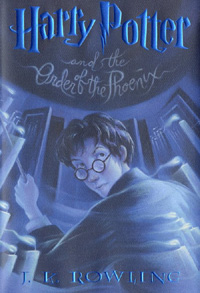 Author: J. K. Rowling Author: J. K. Rowling
Started: 22 Nov 2005
Finished: 4 Dec 2005
870p / 13d
67 p/d
I started reading Book 5 a couple of weeks before we got to see the movie of Book 4. By the time we got out of the movie I only had 150 pages left or some such. So, silly me, what did I do? I stayed up all night finishing it. Only had about an hours sleep before I had to get up to go to work. But you get to that sort of point in that kind of book, and you just can’t stop, it would be wrong!
Anyway, I can’t actually remember the last Harry Potter book before this (as mentioned when I talked about its movie) but I enjoyed this one. You can tell by my average rate of 67 pages a day. That is a lot for me! That is partially because it is the kind of book that makes you want to pick it up and read it rather than watching some TV or doing something else. And of course it is partially because it is relatively lareg print at probably a 5th grade reading level or so. Not all that many dense hard to understand sentences that you have to go back and read several times to get the point. Like the Jefferson Davis book. :-)
Anyway, if you like any of the HP books, you will of course like this one. They get a bit darker and more serious as they go on, and the transition as the kids get older seems to be done pretty well.
Well, I have to run to lunch. Meeting Brandy and joining Amy for lunch at the school. But not eating the school lunches ourselves. That would be crazy!
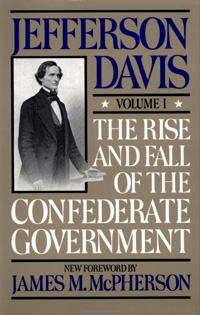 Author: Jefferson Davis Author: Jefferson Davis
Started: 25 Jun 2005
Finished: 22 Nov 2005
604p / 151d
4 p/d
This is the first half of a two volume explaination and justification of the Confederacy by the first and only President of the Confederate States of America written a number of years after the end of the Civil War. A long time ago now… I think when I was still in New Jesey, not even Pennsylvania, definately not in Florida… I saw this at a book store and made one of my fairly rare book purchases NOT from Amazon. They had both volumes, but I thought I would start with one.
I’d always been facinated by the idea of history from the view of the losers, and also with first hand perceptions rather than historical analysis. I saw it on the shelf and I just instantly wanted it. It had lots of pages. Lost of pages with dense type. Lots of pages with dense type consisting of verbose 19th century prose. Lots of pages with dense type consisting of verbose 19th century prose by a historical figure I knew suprisingly little about. I wanted it.
So I bought it. Years later it finally came to the front of my shelf pof books to read. (Of course, that was partially because many books that had been on that shelf are still in boxes). So I started it.
It was indeed dense. Some portions you really had to slog through, but from the very first chapters I was absolutely facinated. He starts with a recap of the adoption of the original articles of confederation and then the replacement of them by the constitution. With some detail on the ratification process, and the fact that most of the states in their retifications included specific language about how adopting the constitution did NOT imply a loss of sovereignty on the part of the states, but rather was a voluntary delegation of certain powers.
If you have known me long, or read certain of my posts here, you know that I am very retro in my views of federalism in general. I think that the change to the popular election of Senators rather than having them appointed by state legislators that happened ealry last century was a mistake. I think that the electoral college should operate as originally intended and be a deliberative body where the electors are elected (or appointed) before any candidates for president even exist (let alone having electors commit in advance to a specific candidate) and then having the electors actually decide on the spot when they vote in January who they will be voting for. I think that the 10th amendment is by far the most important of the bill of rights and should not be the completely ignored step-child that it is these days. I believe that we would be better off if the states really did live up to their name and act as essentially independant sovereign entities rather than essentially provinces of a strong central government… and as such almost all domestic issues should be decided on the state level and not the federal level… and I am also very literalist in interpretation of the constituation and various laws. I’m not big on the idea of “interpreting” beyond the actual text, aside from perhaps being knowledgeable of the changes in linguistic usage between when whatever it was was written and the current day… I almost always think that following the correct process is more important than acheiving the correct results… and I’ve always thought it a very strange thing the notion that states did NOT have the right to exit the union if they ever decided to.
Having said all that, I found myself VERY sympathetic to most of the arguments made by Mr. Davis in the first half or so of the book. (The part covering the events before the actual start of the Civil War.) He makes a very strong case for the legality of sucession given the constitution, the nature of the situation surrounding the original creation of the constitution, etc. And I tend to agree with him. I must admit, I have not read or examined beyond skimming, Texas v. White the 1869 post-Civil War Supreme Court Decision that officially decided that states indeed did not have the right to leave the Union, essentially ratifying the actions of the Lincoln administration after the fact. There may be some compelling arguments there, and I do look forward to eventually doing more reading on the other side of the question.
This of course does NOT mean I favor the South’s opinion on slavery of course. I found it very interesting the lengths Mr. Davis went through to avoid that issue in his writings. (Although more explicit references were made in some of his speeches quoted in the Appendices.) He dispenses with it in the very early chapters essentially saying while it was the trigger issue that exposed the sectional differences leading up to the war, what issue it was was essentially irrelevent, and that the fundamental issues were the larger ones of Federalism. Now… to some extent that still seems disingenous. If slavery hadn’t been the issue, then there might not have been an issue. In legal terms, the war was about the right of states to leave the union. But in practical terms, slavery was the real issue. The way in which Mr. Davis time after time refered to the rights of sothern people to move to the territories with “their property” was disturbing and really in and of itself provided a glimpse into the mindset.
Of course, one argument could be made that even if the states had the right to leave the union, because the slaves were not represented in the state governments or conventions that decided to leave, the actions were null and void because they were not made by a legitimate representation of the people of those states. Of course, by that argument, none of the other states or the US federal government was legitimate either since women were not allowed the vote, not to mention other disenfranchised groups. I don’t think that argument goes.
One could argue that whatever the constitutional legalities, the north had a MORAL obligation higher than the legal obligations to bring the south inline and end the institution of slavery. But by those rights, would not that obligation extend outside the boundaries of the US too? To me it seems clear that the course of action that would have done the right thing legally, but still addressed the moral concerns would have been to acknoledge the right of states to leave the union. Let the south go and become an independant country… and THEN declare war on them. War could be justified because of the moral slavery issue, and also because a large slave holding country controlling access to the Mississippi River would be a threat to security of the country.
So give them their independance, then declare war, then invade and take over, hold as a protectorate or whatnot, then eventually if the north felt like it, allow them to be readmitted as states again. In terms of actual results, this is essentially what happened anyway, but just describing it and wording it a bit differently, and doing things in such a way that you would not have to put strange warped glasses on in order to try to read the constitution in such a way that would not allow the South to leave. And also without in the process of the war allowing other violations of constitutional rights and in general a huge expansion of Federal power and the dramatic destruction of many of the most important concepts of Federalism. (Many of the rest were eroded over the many years since… we have very little of it left at this point… I constantly listen to the news and wonder if ANY of the people involved in any of the three federal branches ever paid attention in civics class when the reasoning behind the development of the US Constitution was covered…)
Or, another possibility, with an admitedly modern flair… let them go, do not declare war, but use tools such as economic sanctions and international pressure. Just due to the way the world economy was developing, slavery most likely would have collasped as an instituation within a few generations anyway… add a little covert action to support underground railroad type missions, support slave insurrections, etc, and you just accelerate that. Once again, without blatantly ignoring the Constitution and Federalist principals.
Anyway… I found that whole part about the detailed events surrounding the year or two immediately before the start of hostilities in the Civil War increadibly facinating. I just had never really studied it before, and this was a very detailed and well written chronology of what happened. (Admittedly from a VERY biased and one-sdied point of view.) And it actually gave some interesting information I just didn’t know about the time between the Article of Confederation and the Constitution as well. For instance, that after the last government under the Confederation and even after the first government under the new Consitution, North Carolina and Rhode Island were both fully independant because the Confederation was no more, but they had not yet ratified the new Constitution? The length of time was not hugely long, but it wasn’t mere days or weeks either. In the interum both states sent Ambassadors to the new Government of the US as foreign entities. I find that kind of thing facinating.
Anyway… the part after the war started was a lot less interesting to me. It started to be about supply chain management and battles and Mr. Davis basically explaining why all the military mistakes made by the South and the deficiencies in their ability to fend off the North were not his fault. Yawn!
The book was slow going. I averaged only 4 pages a day. Because unlike a nice lightweight novel, I had to really be in a nice quiet place where I could concentrate for more than a couple minutes at a time to read it. This was not a book I could read while other things were going on around me. I really had to concentrate on reading. So I’d read a few pages or a chapter, but then it might be a week or more until I picked up the book again. It was even more the one time I left the book at a hotel and after calling their lost and found for awhile unsuccessfully had to order a new one.
Anyway, the war stuff is less interesting, but I still very much want to get Volume II and read it too. Not so much for the rest of the military events leading up to the defeat of the South, but to hear some of what Davis has to say about reconstruction, another time period about which I know a lot less than I wish I knew.
I’d also like to put on my reading list some contemporanous accounts of this whole period from the perspective of prominant Northern politicians… obviously Lincoln didn’t live long enough to write up his perspectives, but I’m sure there are more than a few things that were written at the time by folks on the Union side that would be equally as facinating as this volume by Jefferson Davis. Again, not looking for military stuff, couldn’t care less about the battles and such, and I’m not looking for historical overviews written in the 20th and 21st centuries, but rather writings by the people who actually lived it, most particularly from the political side of things.
Love this stuff.
And I loved this book. It was just very facinating, instructive, and thought provoking. The best combination!
Anyway… I’m guessing this is long enough and nobody has actually read this far, so I guess I will stop now. :-)
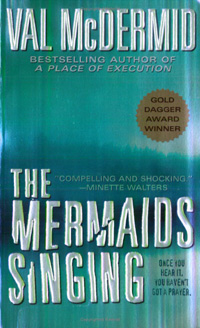 Author: Val McDermid Author: Val McDermid
Started: 14 Jun 2005
Finished: 25 Jun 2005
379p / 12d
32 p/d
Last year some time Brandy’s wishlist on the Tivo for “ancient”, which normally gets documentaries on ancient Rome and Egypt and such, got an episode of a series on BBC America called Wire in the Blood. It was a serial killer / murder mystery type thing. This episode happened to have a portion of it set in some ancient ruins. (As it turned out, it was the second episode of the second series.) We watched it. I liked it. Brandy loved it. She got hooked. Before long, we’d gotten caught up watching all the episodes. While waiting for the third series, at some point I discovered that the TV series was based on a series of novels. So I got Brandy all the novels. She devoured them in a matter of days.
Now, many months later, I decided to read the first of those novels. (Normally it would have gone to the end of my multi-year book pile, but not all of that pile has been found and unpacked, and I needed a fiction book.)
Anyway… I think this is the first book I have actually ever read in the mystery genre. I don’t know why, I’ve never felt any inclination to try that genre, and have actually felt a bit of an aversion for it.
I did like it though. The books have a bit of a different tone that the TV show… a bit darker and more explicit. But the TV show gets the tone of the relationships between the main characters right. It does get pretty graphic with some of the sexual violence that happens to the victims. (All men in this case.) More graphic than I probably needed, although I understand how having it in there contributes directly to the impact of what was going on. Without the detail, it would lose some of the punch.
But still. Ick! Did I really need to learn about pears? No, I probably would have been quite content to go through my entire life without reading about those. (Just one of many torture devices discussed and used in the book.)
Having said all that, I did enjoy the book, it kept me turning pages. 32 pages per day indicates it caught my attention enough so I would grab the book and read whenever I had a few moments, rather than forcing myself to read a bit every once in awhile or whatever.
I like the TV show. The book was different but still compelling. I’ll probably read some of the others.
Brandy says that for me to keep the book after I borrow it and read it, so it can go into my shelf of read books perminantly, I have to get her a new copy, but hardcover. Some of the hardcover versions are out of print. But I’ll get them if that is what it takes! The book must be on my shelf!! With a little library card in it! In order by when I read it!
 Author: Jerry Walls Author: Jerry Walls
Started: 30 May 2005
Finished: 14 Jun 2005
64 p / 16 d
4 p/d
The last skink book I read was just about skinks in general. This skink book is about the kind of skink Mike is. (Scroll down to see him on that link.) It still covers a veriety of sub-types of skink, but all in the same basic group as Mike.
Things I learned: Mike will need a bigger tank soon. The one we have right now is at about the lower limit given how he has been growing. He also would probably like it if we had his tank slightly hotter than we do. Where it is is OK, but he might not mind even warmer. By just a tad. Mike is very tame, and likes to be hand fed, but could probably use a bit more actual handling than we have been giving him lately (hey, we’ve been busy!) so as to further develop his personality.
The book also had a few things to say about breeding skinks, but I don’t think we will be going there.
 Author: Gregory Maguire Author: Gregory Maguire
Started: 15 May 2005
Finished: 30 May 2005
409 p / 16 d
26 p/d
I saw the musical of this a little over a year ago. It was great fun. Went with Brandy and Amy. Soon after I saw there was a book. I think I got copies as presents for a couple of people at one point or another. I knew that the book was darker and more political than the play, which while it had a few serious undertones if you looked for them, was basically a fun and lighthearted romp. One of the people I gave the book too was my teenage sister. I figured she’d like the political and animal rights bits… Oops, make that Animal rights. In any case, as I read the book the one thing I had NOT realized was different about the book was the sex. Yup, it has a bunch of sex. Including with Animals. And I gave it to my 14 year old (at the time) sister. Oops. She read it long before I did and sent an email saying it was “interesting”. :-)
Well, odd sexual bits aside, it definately was interesting. I like the whole idea of looking at a story from the side of one of the supporting characters. It is just a concept that gets my attention. First time I remember coming across that sort of thing was Rosencrantz and Guildenstern Are Dead. We read the play in high school. I think I saw the actual play once. Never saw the movie I just linked to. Anyway, it got my attention right away. I don’t remember much of it, but I remember the concept.
It worked well with Bean in the second set of Ender books written from Bean’s perspective. (I haven’t read all of those yet though.)
Anyway, I like the concept. In this case, tell the life story of the Wicked Witch of the West. Who is she really? Why is she how she is? What leads up to the events we all know in the Wizard of Oz. I liked a lot of the excecution. It is much darker than the play, and I think in some ways TOO dark and serious and political. I like it darker and more serious, but at times I think it went a little too far than needed to make the point. I do like how it is all put together though, and was facinated by the investigation into the backstory.
The ending is of course COMPLETLY different from the play. The play’s ending was a little cheesy, but the book just hammers the negativity down and down and down… the witch just fails at everything utterly, and it ends as it did in the original Oz. Very tragic, very sad. Poor witch. I’m OK with the unhappy ending itself, but what drives me nuts is the number of loose ends left open. Question after question after questions are raised, but then they are all left open and unresolved.
Of course, I guess that is part of the point. Still frustrating though.
I did like it though. The author has apperantly done a couple more of these. One on Cinderella and one on Snow White. I am tempted, but not sure I’ll be jumping right on reading those. Maybe. I’ll think about it a bit.
I do recommend reading Wicked. But if given a choice between the book and the musical, in this case I’d pick the musical. (Although it is a shame that Kristin Chenowith has moved on to bigger and better things. She was an increadible Galinda!)
 Author: Jerry G. Walls Author: Jerry G. Walls
Started: 9 Apr 2005
Finished: 15 May 2005
63p/7d
9 p/d
A book about Skinks that had been on the to read pile ever since we got Mike. Even though it got accellerated higher in the pile because it was a “need to read soon” thing, I still didn’t get to it now. Basically this was a guide to all kinds of skinks, not just the blue-tounged kind like Mike. Where they come from, how to take care of them, etc. Lots and lots of pictures of different kinds of skinks. Nice glossy pictures. Lots of them are very pretty. Some are just interesting. None as cool looking as Mike though. Of course.
It had a bunch of interesting stuff, but in terms of Mike, only a very small portion of the book really pertained directly. Some of the general info did, but turns out there are big differences in how to care for different kinds of skinks. So a book more specific to blue-tounge skinks would probably be better. Luckily enough, there is one of those by the same author, and it is only a couple books down on the book pile…
|
|
 Author: Phillip Jose Farmer
Author: Phillip Jose Farmer







